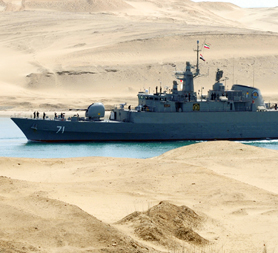Iranian warships sail through Suez canal
Only weeks after Egypt fell to revolution, Iran sends ‘training’ ships through the Suez canal to the Mediterranean after reaching agreement with the new Egyptian regime.

Iran has sent two naval ships through the Suez Canal for the first time since the Islamic revolution of 1979. Egyptian officials confirmed that a naval frigate and a supply ship had been approved passage.
The journey has caused great concern in Israel as to the purpose of the exercise. The Israeli Government has long suspected Iran and Syria of supplying weapons to Hezbollah militia.
Iranian officials have confirmed that the ships are heading to Syria, but for training purposes. The Iranian news network Fars reported on 26 January that cadets were embarking on a year-long training regime to defend oil tankers and cargo ships against Somali pirates.
“Israel takes a grave view of this Iranian step.” Israeli Prime Minister, Binyamin Netanyahu
The Israeli Prime Minister Binyamin Netanyahu has said Iran has used the troubles in the region for opportunistic tactical gain: “We can see what an unstable region we live in, an area in which Iran is trying to take advantage of the situation that has arisen and broaden its influence by transferring two warships via the Suez Canal. Israel takes a grave view of this Iranian step”
Iraeli Foreign Minister Avigdor Lieberman repeated Mr Netanyahu’s fears and warned that Israel will react to continued provocation: “To my regret, the international community is not showing readiness to deal with the recurring Iranian provocations. The international community must understand that Israel cannot forever ignore these provocations.”
US response in the area has been to mobilise its fleet of naval ships to monitor the activities of the Iranian vessels. The USS Enterprise, missile-cruise USS Leyte Gulf and a supply ship ‘faced-off’ the Iranian ships at the Red Sea entrance to Suez. A further four carriers are all in the region.
The Iranian naval movements put into context
Channel 4 News spoke to Alastair Crooke, Director and Founder of Conflicts Forum, an international group that engages with Islamist movements.
"There is a striking contrast between how the movements of these ships is being reported in the west and in Iran and the region," he said. "There is apparently huge concern in Europe, America and Israel but here there is very little concern at all, people are more interested in what is going on in the region.
"It's more a symbolic sign of change taking place. I think it's striking for two reasons, firstly that they stopped off in Jeddah, Saudi Arabia on the way, and now move through Suez to Syria. Secondly, the roots go much further back, the original idea to release these ships goes back to when the US revealed they would increase their naval presence in the Eastern Mediterranean. The underlying rationale goes back to last February (2010) where Iran, Lebanon, Syria and Hezbollah representatives met and agreed that if we are attacked individually or action taken against us we are united in a single defence. If the US put their ships on the coast of Syria it would not be unnatural for an ally to do that too. Iran has seen itself as being threatened by America consistently and this year the US has deployed huge naval forces off the Iranian coast. They also feel surrounded by strategic US bases in Iraq and Afghanistan, trying to contain them.
"Fears that these ships will be transporting weapons seems unlikely, and unneccesary. The Israelis say that Hezbollah has already re-armed since 2006, quantatively and qualitatively, a few extra missiles will not change the balance. It is also quite unlikely a risk for Iran as they have declared that any attack on one of their ships would be considered an act of war.
"There are common grievances across the Middle East nations that are in the process of reform, economic inequities, corruption, bribery and cronyism that is linked to neo-liberalism by its long-term support from the West. Newly-liberated countries are likely to turn to their old morals and culture as a guide to forming new governments. For example, most of Egypt lives a pious Muslim existence, their culture is Islamic, their language is Islamic and clearly they live by the values of Islam.
"Israel are right to be worried, though. From their perspective they are suddenly without the certainty on their southern borders and they are now much more isolated in the region. Egypt has 80 million people and a large army, this is a far greater threat than Jordan. In the present circumstances any intervention by Israel in the context of Gaza or Egypt could exacerbate the problems in the region further. Israel must understand the the popular support for Palestine in Egypt. An ordinary popular opinion in Egypt has been humiliated by what they have seen happen in Gaza. Whatever government takes control in Egypt there will be a change in their relationship with Israel, I can't imagine it will go back to how it was under Mubarak."
-
Latest news
-
Taylor Swift’s new break-up album breaks records3m

-
NHS trust fined £200K for failings that led to death of two mental health patients3m

-
Sunak vows to end UK ‘sick note culture’ with benefit reform3m

-
‘Loose talk about using nuclear weapons is irresponsible and unacceptable’, says head of UN’s nuclear watchdog3m

-
‘There wasn’t an Israeli attack on Iran,’ says former adviser to Iran’s nuclear negotiations team7m

-




